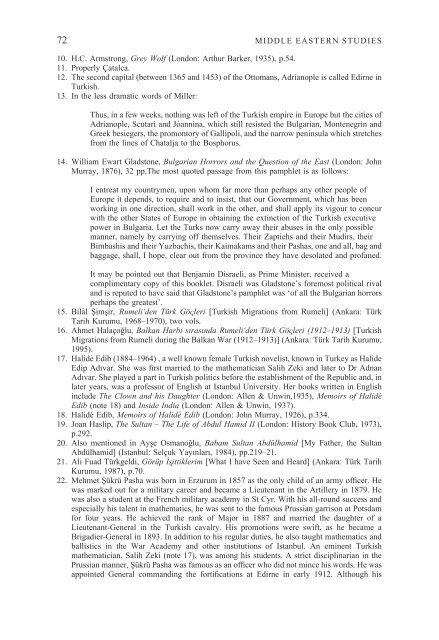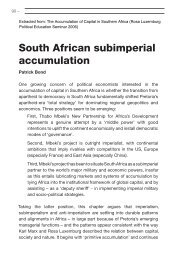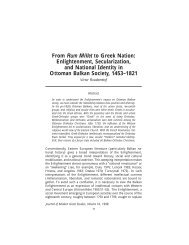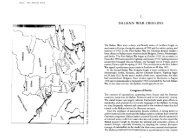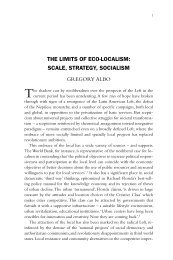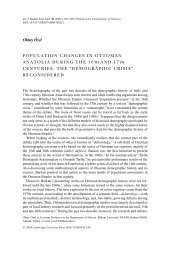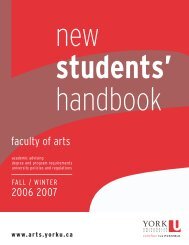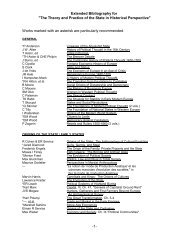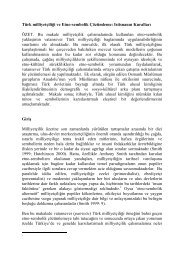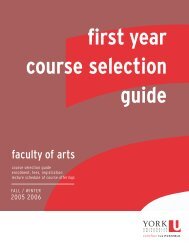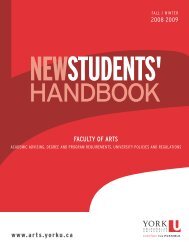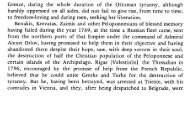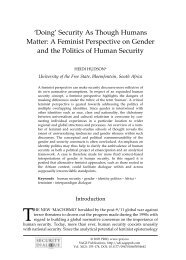Wasti, S. T. "The 1912-13 Balkan Wars and the Siege of Edirne"
Wasti, S. T. "The 1912-13 Balkan Wars and the Siege of Edirne"
Wasti, S. T. "The 1912-13 Balkan Wars and the Siege of Edirne"
Create successful ePaper yourself
Turn your PDF publications into a flip-book with our unique Google optimized e-Paper software.
72 MIDDLE EASTERN STUDIES10. H.C. Armstrong, Grey Wolf (London: Arthur Barker, 1935), p.54.11. Properly Çatalca.12. <strong>The</strong> second capital (between <strong>13</strong>65 <strong>and</strong> 1453) <strong>of</strong> <strong>the</strong> Ottomans, Adrianople is called Edirne inTurkish.<strong>13</strong>. In <strong>the</strong> less dramatic words <strong>of</strong> Miller:Thus, in a few weeks, nothing was left <strong>of</strong> <strong>the</strong> Turkish empire in Europe but <strong>the</strong> cities <strong>of</strong>Adrianople, Scutari <strong>and</strong> Jóannina, which still resisted <strong>the</strong> Bulgarian, Montenegrin <strong>and</strong>Greek besiegers, <strong>the</strong> promontory <strong>of</strong> Gallipoli, <strong>and</strong> <strong>the</strong> narrow peninsula which stretchesfrom <strong>the</strong> lines <strong>of</strong> Chatalja to <strong>the</strong> Bosphorus.14. William Ewart Gladstone, Bulgarian Horrors <strong>and</strong> <strong>the</strong> Question <strong>of</strong> <strong>the</strong> East (London: JohnMurray, 1876), 32 pp.<strong>The</strong> most quoted passage from this pamphlet is as follows:I entreat my countrymen, upon whom far more than perhaps any o<strong>the</strong>r people <strong>of</strong>Europe it depends, to require <strong>and</strong> to insist, that our Government, which has beenworking in one direction, shall work in <strong>the</strong> o<strong>the</strong>r, <strong>and</strong> shall apply its vigour to concurwith <strong>the</strong> o<strong>the</strong>r States <strong>of</strong> Europe in obtaining <strong>the</strong> extinction <strong>of</strong> <strong>the</strong> Turkish executivepower in Bulgaria. Let <strong>the</strong> Turks now carry away <strong>the</strong>ir abuses in <strong>the</strong> only possiblemanner, namely by carrying <strong>of</strong>f <strong>the</strong>mselves. <strong>The</strong>ir Zaptiehs <strong>and</strong> <strong>the</strong>ir Mudirs, <strong>the</strong>irBimbashis <strong>and</strong> <strong>the</strong>ir Yuzbachis, <strong>the</strong>ir Kaimakams <strong>and</strong> <strong>the</strong>ir Pashas, one <strong>and</strong> all, bag <strong>and</strong>baggage, shall, I hope, clear out from <strong>the</strong> province <strong>the</strong>y have desolated <strong>and</strong> pr<strong>of</strong>aned.It may be pointed out that Benjamin Disraeli, as Prime Minister, received acomplimentary copy <strong>of</strong> this booklet. Disraeli was Gladstone’s foremost political rival<strong>and</strong> is reputed to have said that Gladstone’s pamphlet was ‘<strong>of</strong> all <strong>the</strong> Bulgarian horrorsperhaps <strong>the</strong> greatest’.15. Bilâl Şimşir, Rumeli‘den Türk Göçleri [Turkish Migrations from Rumeli] (Ankara: TürkTarih Kurumu, 1968–1970), two vols.16. Ahmet Halaçoğlu, <strong>Balkan</strong> Harbi sırasında Rumeli‘den Türk Göçleri (<strong>1912</strong>–19<strong>13</strong>) [TurkishMigrations from Rumeli during <strong>the</strong> <strong>Balkan</strong> War (<strong>1912</strong>–19<strong>13</strong>)] (Ankara: Türk Tarih Kurumu,1995).17. Halidé Edib (1884–1964) , a well known female Turkish novelist, known in Turkey as HalideEdip Adıvar. She was first married to <strong>the</strong> ma<strong>the</strong>matician Salih Zeki <strong>and</strong> later to Dr AdnanAdıvar. She played a part in Turkish politics before <strong>the</strong> establishment <strong>of</strong> <strong>the</strong> Republic <strong>and</strong>, inlater years, was a pr<strong>of</strong>essor <strong>of</strong> English at Istanbul University. Her books written in Englishinclude <strong>The</strong> Clown <strong>and</strong> his Daughter (London: Allen & Unwin,1935), Memoirs <strong>of</strong> HalidéEdib (note 18) <strong>and</strong> Inside India (London: Allen & Unwin, 1937).18. Halidé Edib, Memoirs <strong>of</strong> Halidé Edib (London: John Murray, 1926), p.334.19. Joan Haslip, <strong>The</strong> Sultan – <strong>The</strong> Life <strong>of</strong> Abdul Hamid II (London: History Book Club, 1973),p.292.20. Also mentioned in Ayşe Osmanoğlu, Babam Sultan Abdülhamid [My Fa<strong>the</strong>r, <strong>the</strong> SultanAbdülhamid] (Istanbul: Selçuk Yayınları, 1984), pp.219–21.21. Ali Fuad Türkgeldi, Görüp İşittiklerim [What I have Seen <strong>and</strong> Heard] (Ankara: Türk TarihKurumu, 1987), p.70.22. Mehmet Şükrü Pasha was born in Erzurum in 1857 as <strong>the</strong> only child <strong>of</strong> an army <strong>of</strong>ficer. Hewas marked out for a military career <strong>and</strong> became a Lieutenant in <strong>the</strong> Artillery in 1879. Hewas also a student at <strong>the</strong> French military academy in St Cyr. With his all-round success <strong>and</strong>especially his talent in ma<strong>the</strong>matics, he was sent to <strong>the</strong> famous Prussian garrison at Potsdamfor four years. He achieved <strong>the</strong> rank <strong>of</strong> Major in 1887 <strong>and</strong> married <strong>the</strong> daughter <strong>of</strong> aLieutenant-General in <strong>the</strong> Turkish cavalry. His promotions were swift, as he became aBrigadier-General in 1893. In addition to his regular duties, he also taught ma<strong>the</strong>matics <strong>and</strong>ballistics in <strong>the</strong> War Academy <strong>and</strong> o<strong>the</strong>r institutions <strong>of</strong> Istanbul. An eminent Turkishma<strong>the</strong>matician, Salih Zeki (note 17), was among his students. A strict disciplinarian in <strong>the</strong>Prussian manner, Şükrü Pasha was famous as an <strong>of</strong>ficer who did not mince his words. He wasappointed General comm<strong>and</strong>ing <strong>the</strong> fortifications at Edirne in early <strong>1912</strong>. Although his


